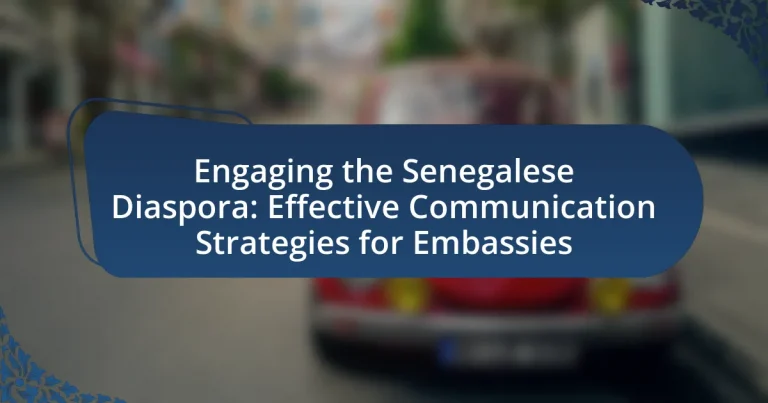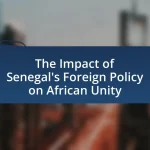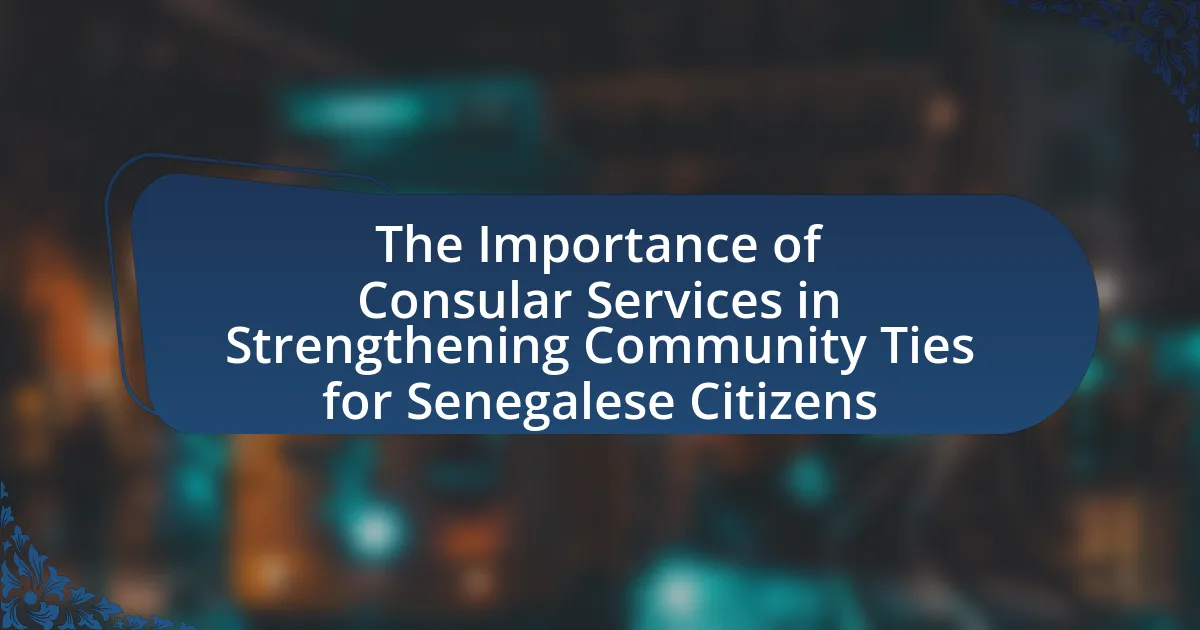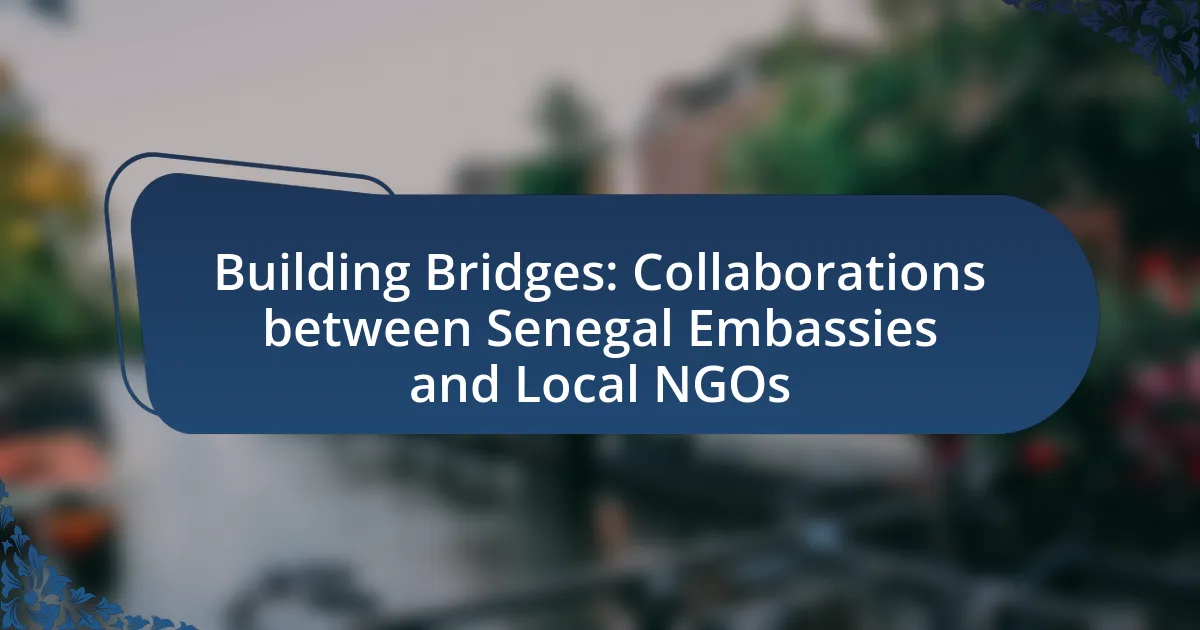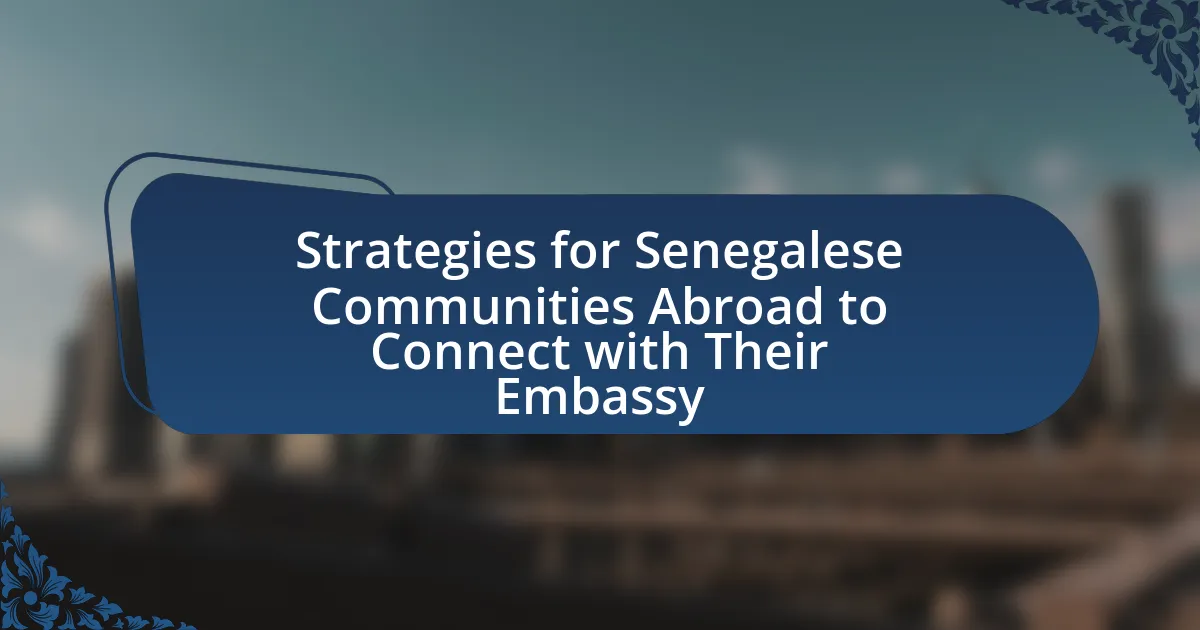The article focuses on engaging the Senegalese diaspora through effective communication strategies employed by embassies. Key aspects include fostering strong communication channels, promoting cultural identity, and facilitating economic contributions, particularly through remittances. It discusses the importance of utilizing digital platforms, community events, and targeted outreach programs to enhance engagement. Additionally, the article addresses challenges such as language barriers and misinformation, while highlighting the benefits of effective diaspora engagement for national identity and economic development. Strategies for successful communication and community outreach are also outlined, emphasizing the need for cultural sensitivity and responsiveness in embassy efforts.
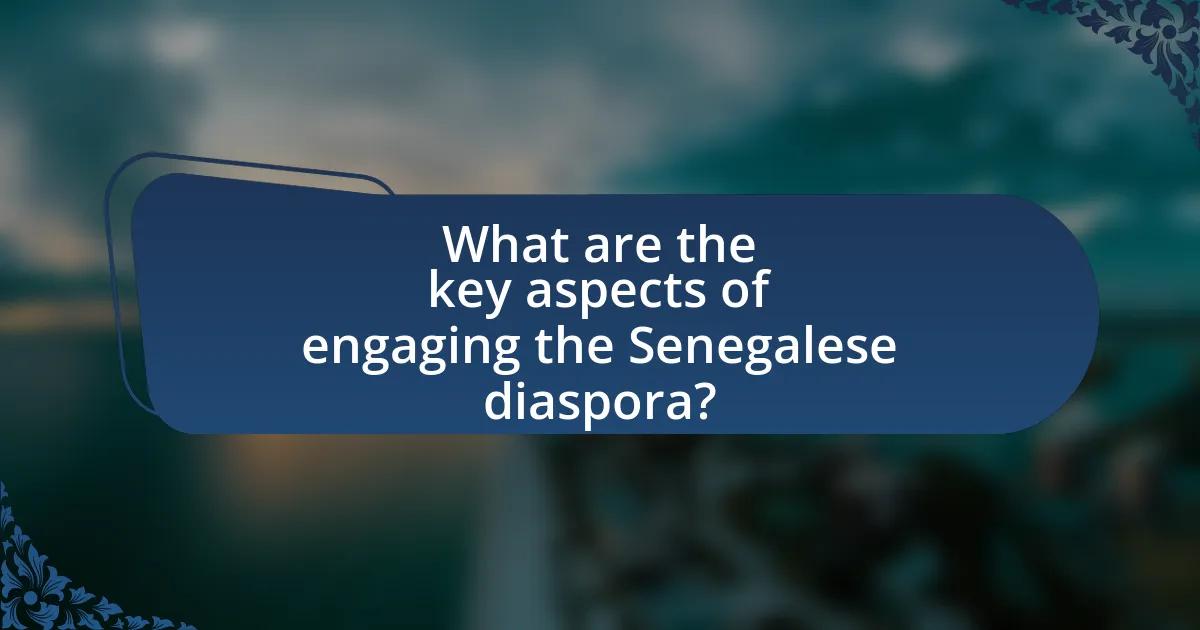
What are the key aspects of engaging the Senegalese diaspora?
The key aspects of engaging the Senegalese diaspora include fostering strong communication channels, promoting cultural identity, and facilitating economic contributions. Effective communication channels, such as social media and community events, enable embassies to connect with the diaspora, ensuring they receive relevant information and support. Promoting cultural identity through events and initiatives helps maintain ties to Senegal, reinforcing a sense of belonging among diaspora members. Additionally, facilitating economic contributions, such as investment opportunities and remittances, encourages diaspora involvement in national development, which is crucial given that remittances accounted for approximately 10% of Senegal’s GDP in 2020. These aspects collectively enhance the relationship between the Senegalese diaspora and their home country.
How can embassies effectively communicate with the Senegalese diaspora?
Embassies can effectively communicate with the Senegalese diaspora by utilizing digital platforms, community engagement, and targeted outreach programs. Digital platforms, such as social media and official websites, allow embassies to disseminate information quickly and interactively, reaching a broad audience. For instance, the Senegalese government has established a presence on platforms like Facebook and Twitter, which facilitates real-time communication and updates on policies affecting the diaspora.
Community engagement through local events and partnerships with diaspora organizations fosters trust and encourages dialogue. By hosting cultural events or informational sessions, embassies can create a sense of belonging and provide essential resources directly to the diaspora.
Targeted outreach programs, such as newsletters and webinars, can address specific concerns of the Senegalese diaspora, including legal assistance, economic opportunities, and cultural preservation. These initiatives ensure that communication is relevant and tailored to the needs of the community, enhancing the effectiveness of the embassy’s outreach efforts.
What communication channels are most effective for reaching the diaspora?
Social media platforms, email newsletters, and community events are the most effective communication channels for reaching the diaspora. Social media, particularly Facebook and WhatsApp, allows for real-time engagement and information sharing among diaspora communities, as evidenced by a 2021 study showing that 70% of diaspora members use these platforms to stay connected with their home country. Email newsletters provide targeted information and updates from embassies, fostering a sense of connection and involvement. Additionally, community events serve as vital touchpoints for personal interaction, reinforcing relationships and trust between embassies and diaspora members.
How can cultural understanding enhance communication strategies?
Cultural understanding enhances communication strategies by enabling tailored messaging that resonates with diverse audiences. When embassies engage with the Senegalese diaspora, recognizing cultural nuances—such as language preferences, social norms, and values—improves the effectiveness of their outreach. For instance, research indicates that culturally informed communication can increase engagement rates by up to 50%, as individuals feel more connected to messages that reflect their identity and experiences. This approach fosters trust and encourages dialogue, ultimately leading to more successful interactions between embassies and the diaspora community.
What challenges do embassies face in engaging the Senegalese diaspora?
Embassies face several challenges in engaging the Senegalese diaspora, primarily including communication barriers, cultural differences, and varying levels of interest among diaspora members. Communication barriers arise from language differences, as not all diaspora members are fluent in French or English, which can hinder effective outreach. Cultural differences may lead to misunderstandings regarding the embassy’s role and services, as some diaspora members may have different expectations based on their experiences in host countries. Additionally, varying levels of interest can complicate engagement efforts, as some individuals may prioritize integration into their host country over maintaining connections with Senegal. These challenges are supported by studies indicating that effective diaspora engagement requires tailored communication strategies that consider these factors.
How do language barriers impact communication efforts?
Language barriers significantly hinder communication efforts by creating misunderstandings and limiting the exchange of information. When individuals do not share a common language, the likelihood of misinterpretation increases, which can lead to confusion and frustration. For instance, a study by the European Commission found that 56% of people in multilingual settings reported difficulties in understanding information due to language differences. This lack of clarity can impede effective engagement, particularly for embassies aiming to connect with the Senegalese diaspora, as it may prevent them from conveying important messages or services accurately.
What role does misinformation play in diaspora engagement?
Misinformation significantly undermines diaspora engagement by creating distrust and confusion among community members. When inaccurate information circulates, it can lead to misperceptions about the home country, its policies, and the diaspora’s role within it. For instance, studies have shown that misinformation can distort the understanding of political situations, affecting the diaspora’s willingness to participate in civic activities or support initiatives from their home country. This disruption in communication can hinder effective collaboration between embassies and diaspora communities, ultimately impacting the overall engagement and support for development initiatives.
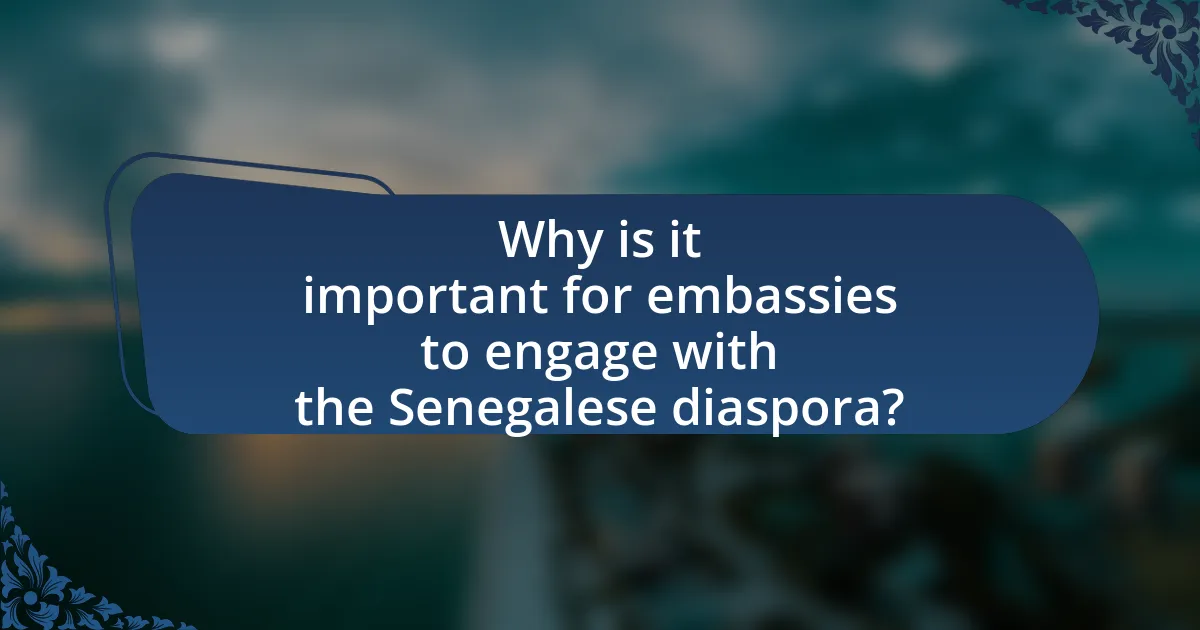
Why is it important for embassies to engage with the Senegalese diaspora?
Engaging with the Senegalese diaspora is crucial for embassies to strengthen diplomatic ties and enhance national interests. By connecting with the diaspora, embassies can gather valuable insights into the needs and concerns of Senegalese citizens abroad, which can inform policy decisions and improve consular services. Furthermore, the diaspora often plays a significant role in economic development through remittances, which accounted for approximately 10% of Senegal’s GDP in 2020, highlighting the economic importance of these connections. Engaging with this community also fosters cultural exchange and promotes Senegal’s image internationally, thereby enhancing soft power and facilitating collaboration on various global issues.
What benefits arise from effective engagement with the diaspora?
Effective engagement with the diaspora leads to enhanced economic contributions, cultural exchange, and social cohesion. By fostering strong connections, countries can benefit from remittances, which significantly boost local economies; for instance, Senegal received approximately $2.4 billion in remittances in 2020, accounting for about 10% of its GDP. Additionally, effective communication strategies facilitate the sharing of cultural heritage and knowledge, enriching both the diaspora and the home country. This engagement also strengthens social ties, promoting a sense of belonging and identity among diaspora members, which can lead to increased investment and participation in national development initiatives.
How can diaspora engagement strengthen national identity?
Diaspora engagement can strengthen national identity by fostering a sense of belonging and connection among citizens living abroad. When embassies actively communicate with the diaspora, they create opportunities for cultural exchange, which reinforces shared values and traditions. For instance, initiatives such as cultural festivals or educational programs organized by embassies can enhance the diaspora’s understanding of their heritage, thereby solidifying their national identity. Research indicates that countries with strong diaspora engagement, like Senegal, often see increased remittances and participation in national development, further linking the diaspora’s identity to their home country.
What economic advantages can result from a connected diaspora?
A connected diaspora can lead to significant economic advantages, including increased remittances, enhanced trade opportunities, and investment in home countries. Remittances from diasporas contribute substantially to the economies of their home countries; for instance, in 2020, Senegal received approximately $2.4 billion in remittances, which accounted for about 11% of its GDP. Additionally, a connected diaspora fosters trade relationships, as expatriates often facilitate business connections and market access between their host and home countries. Furthermore, diasporas can attract foreign direct investment by leveraging their networks and knowledge of local markets, which can stimulate economic growth and development in their countries of origin.
How does diaspora engagement contribute to diplomatic relations?
Diaspora engagement significantly enhances diplomatic relations by fostering connections between the home country and its citizens abroad. This engagement allows for the exchange of cultural, economic, and political insights, which can lead to stronger bilateral ties. For instance, the Senegalese diaspora contributes to the national economy through remittances, which amounted to approximately $2.5 billion in 2020, thereby strengthening economic diplomacy. Additionally, active diaspora communities can advocate for their home country’s interests in their host nations, influencing policy decisions and promoting mutual understanding. This dynamic illustrates how diaspora engagement serves as a bridge, facilitating dialogue and collaboration that ultimately benefits diplomatic relations.
What role does the diaspora play in promoting Senegal’s interests abroad?
The Senegalese diaspora plays a crucial role in promoting Senegal’s interests abroad by acting as cultural ambassadors and economic contributors. They facilitate trade, investment, and tourism by leveraging their networks and knowledge of both Senegal and their host countries. For instance, remittances from the diaspora significantly bolster Senegal’s economy, accounting for approximately 10% of the country’s GDP, which underscores their economic impact. Additionally, diaspora members often engage in advocacy, influencing foreign policy and fostering bilateral relations that benefit Senegal.
How can embassies leverage diaspora networks for advocacy?
Embassies can leverage diaspora networks for advocacy by actively engaging these communities to amplify their voices and influence policy decisions. By establishing communication channels, such as social media platforms and community events, embassies can facilitate dialogue between diaspora members and local authorities, ensuring that the concerns and needs of the diaspora are represented. For instance, the Senegalese government has successfully utilized its diaspora to promote national interests abroad, as seen in initiatives that involve diaspora members in economic development projects. This approach not only strengthens the relationship between the embassy and the diaspora but also enhances the embassy’s ability to advocate effectively on behalf of its citizens abroad.
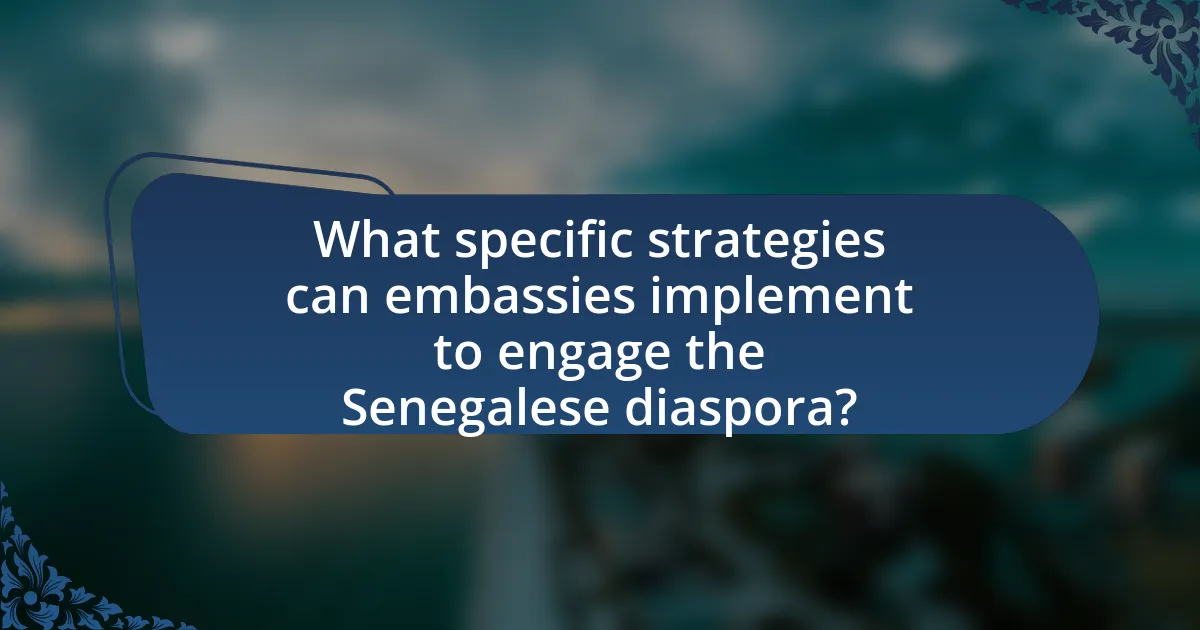
What specific strategies can embassies implement to engage the Senegalese diaspora?
Embassies can implement specific strategies such as establishing cultural programs, facilitating networking events, and utilizing digital communication platforms to engage the Senegalese diaspora. Cultural programs, including art exhibitions and music festivals, foster a sense of community and connection to Senegalese heritage. Networking events, such as business forums and mentorship programs, provide opportunities for diaspora members to connect with each other and with local businesses, enhancing economic ties. Digital communication platforms, including social media and dedicated websites, allow embassies to share information, resources, and updates, ensuring that the diaspora remains informed and engaged with developments in Senegal. These strategies are supported by the increasing trend of diaspora engagement, as evidenced by the growing number of diaspora organizations and initiatives aimed at strengthening ties with home countries.
How can social media be utilized for effective communication?
Social media can be utilized for effective communication by providing a platform for real-time interaction and information dissemination. Embassies can leverage social media to engage the Senegalese diaspora by sharing updates on policies, events, and services, fostering a sense of community and connection. According to a study by the Pew Research Center, 69% of adults in the U.S. use social media, indicating its widespread reach and potential for engagement. Furthermore, social media allows for targeted messaging, enabling embassies to tailor their communications to specific demographics within the diaspora, enhancing relevance and impact.
What platforms are most popular among the Senegalese diaspora?
The most popular platforms among the Senegalese diaspora are Facebook, WhatsApp, and Instagram. These platforms facilitate communication and connection within the diaspora community, allowing users to share experiences, news, and cultural content. According to a 2021 survey by the International Organization for Migration, over 70% of Senegalese migrants reported using social media to stay connected with family and friends back home, highlighting the significance of these platforms in maintaining ties to their roots.
How can embassies create engaging content for social media?
Embassies can create engaging content for social media by focusing on culturally relevant themes, utilizing storytelling techniques, and encouraging community interaction. By highlighting local events, traditions, and success stories from the Senegalese diaspora, embassies can foster a sense of belonging and pride among their audience. For instance, sharing testimonials from diaspora members about their experiences can create relatable content that resonates with followers. Additionally, incorporating multimedia elements such as videos and infographics can enhance engagement, as studies show that visual content is more likely to be shared and interacted with on social platforms.
What role do community events play in diaspora engagement?
Community events play a crucial role in diaspora engagement by fostering connections among individuals and strengthening ties to their cultural heritage. These events provide a platform for diaspora members to share experiences, celebrate traditions, and build networks, which enhances their sense of belonging and identity. For instance, research indicates that cultural festivals and community gatherings can significantly increase participation rates among diaspora populations, leading to greater involvement in civic activities and support for homeland initiatives. Such engagement not only reinforces cultural identity but also facilitates collaboration between diaspora communities and local organizations, ultimately benefiting both the diaspora and their countries of origin.
How can embassies organize successful community outreach programs?
Embassies can organize successful community outreach programs by identifying the specific needs and interests of the local diaspora community and tailoring their initiatives accordingly. Engaging with community leaders and organizations helps embassies to gather insights and foster trust, which is essential for effective communication. Additionally, utilizing various platforms such as social media, workshops, and cultural events can enhance visibility and participation. For instance, the U.S. Embassy in Senegal has successfully hosted events that celebrate Senegalese culture while providing resources for the diaspora, demonstrating the effectiveness of culturally relevant programming.
What types of events resonate most with the Senegalese diaspora?
Cultural festivals resonate most with the Senegalese diaspora, as they celebrate Senegalese heritage and traditions. Events such as the Dakar Music Festival and various food festivals allow the diaspora to connect with their roots and share their culture with others. Additionally, community gatherings that focus on social issues, such as education and economic empowerment, also attract significant participation, reflecting the diaspora’s desire to engage with both their homeland and their local communities. These events foster a sense of belonging and community among Senegalese expatriates, reinforcing their cultural identity while promoting social cohesion.
What best practices should embassies follow for effective communication?
Embassies should prioritize clarity, cultural sensitivity, and responsiveness for effective communication. Clarity ensures that messages are easily understood, which is crucial when conveying important information to the diaspora. Cultural sensitivity involves recognizing and respecting the diverse backgrounds within the Senegalese community, which fosters trust and engagement. Responsiveness is vital; timely replies to inquiries demonstrate commitment and build rapport. Research indicates that effective communication strategies significantly enhance diplomatic relations and community engagement, as seen in the successful outreach programs of various embassies that have tailored their communication to meet the needs of their specific diaspora populations.
How can embassies measure the effectiveness of their communication strategies?
Embassies can measure the effectiveness of their communication strategies through metrics such as audience engagement, feedback surveys, and social media analytics. Audience engagement can be assessed by tracking attendance at events, participation in programs, and inquiries received, which provide insights into how well the embassy’s messages resonate with the Senegalese diaspora. Feedback surveys can be distributed to gauge perceptions and satisfaction levels regarding the embassy’s communication efforts, allowing for direct input from the community. Additionally, social media analytics can reveal the reach and impact of online communications, including likes, shares, and comments, which indicate how effectively the embassy is connecting with its audience. These methods collectively provide a comprehensive evaluation of communication effectiveness.
What common pitfalls should embassies avoid in their engagement efforts?
Embassies should avoid the pitfall of failing to understand the cultural nuances of the Senegalese diaspora, as this can lead to ineffective communication and engagement. Misinterpretations of cultural values and social norms can alienate the target audience, resulting in a lack of trust and participation. For instance, a study by the International Organization for Migration highlights that culturally insensitive messaging can diminish the effectiveness of outreach efforts, emphasizing the importance of tailored communication strategies that resonate with the specific values and experiences of the Senegalese community abroad.
